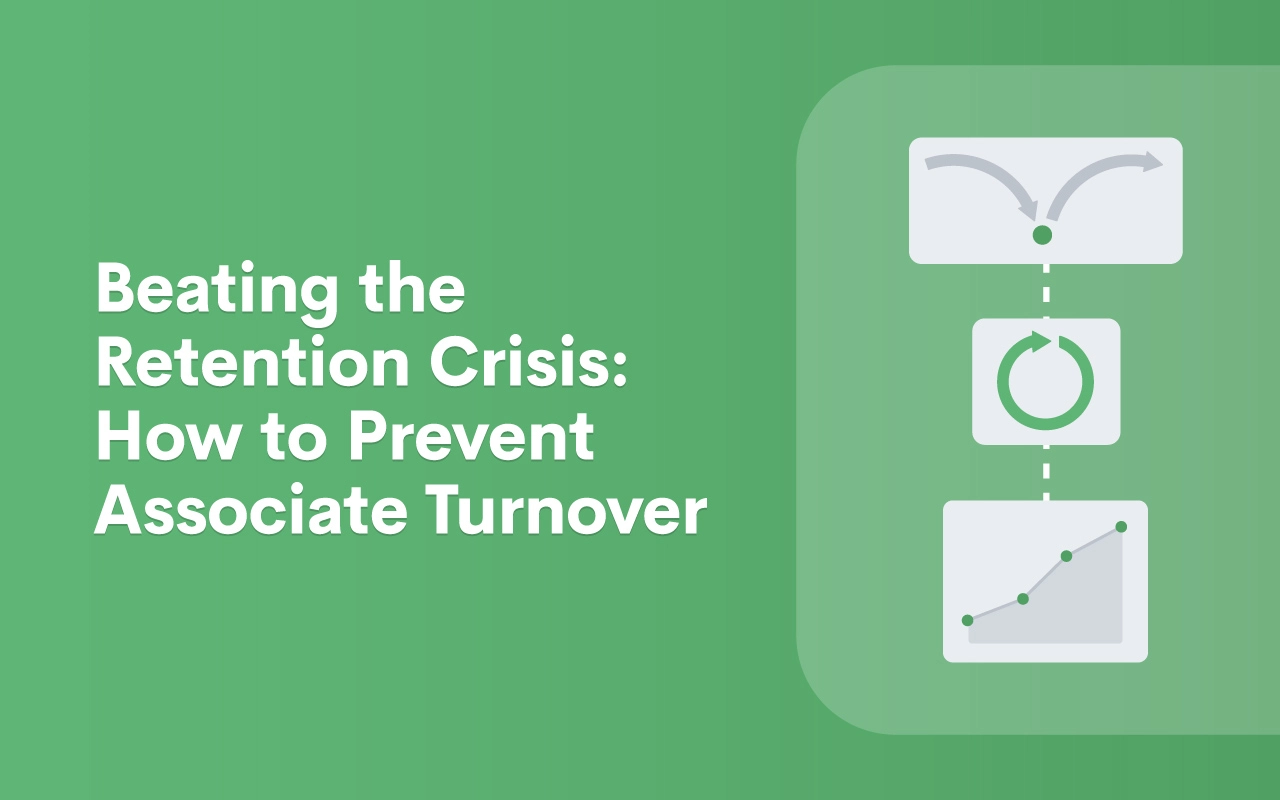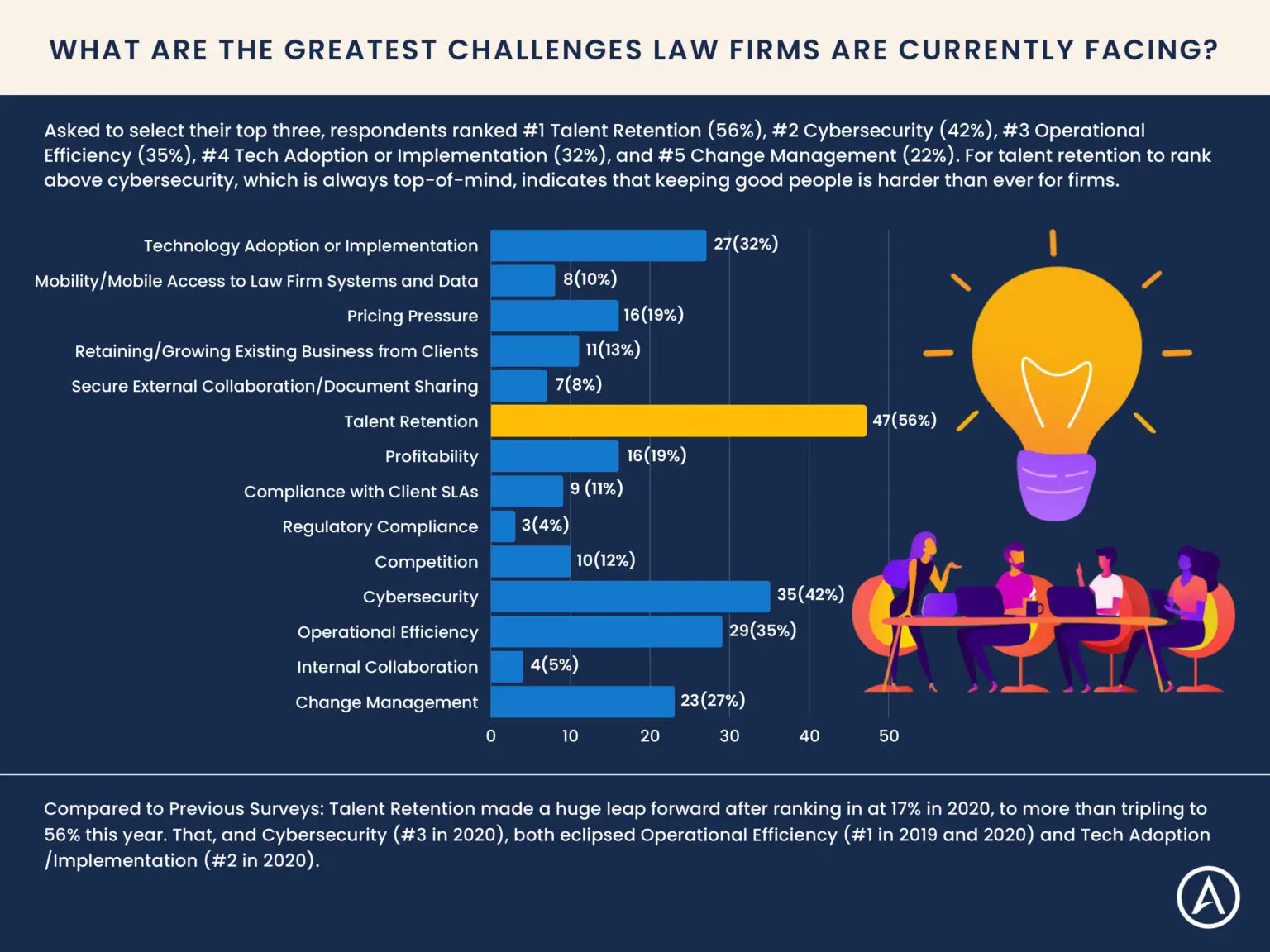Beating the Retention Crisis: How to Prevent Associate Turnover

Where have all the associates gone? Based on numerous annual reports regarding the state of the legal industry, associate turnover has been a top pain point for attorneys in the past few years. Here is a sampling:
- A 2021 McKinsey study found that more than 50 percent of employers face lower-than-average employee retention rates. In November 2021, approximately 4.5 million U.S. workers decided to leave their places of employment.
- Major, Lindsey and Africa and Above the Law recently reported that a third of junior lawyers do not plan to stay with their law firms beyond five years. Moreover, many young lawyers don’t expect to spend their entire career in the same law firm, much less make partner.
- Thomson Reuters 2022 Report on the State of the Legal Market found that associate turnover is approaching 25 percent and predicted that firms could expect more than a 100 percent turnover among associates in the coming five years.
- White-collar jobs take an average of 68 business days to fill, and some take as long as four months, depending upon the level and salary range. A law firm’s lateral hiring process can take three to 12 months.
The real cost of associate attrition
According to a Society for Human Resource Management (SHRM) study, the average cost per new hire is almost $4,700. However, many employers estimate the total cost to hire a new employee can be three to four times the position's salary.
When an associate quits, things get expensive quickly. Many actual and inopportune costs are absorbed by a business trying to fill an open position, and law firms are no different. Recruitment, posting, interviewing, onboarding, and training all take valuable time. In addition, there are soft costs: lost momentum, hiring replacement workers, and reassigning other employees to cover the responsibilities of the one who quits until you can fill the position.
According to a 2023 report from the New York Law Journal, there are basically seven stages to associate attrition:
- The pre-exit, checked-out stage
- The “they’re gone, nobody’s billing” stage
- The hunt to find a replacement stage
- The contagion of quitters stage
- The “we found someone; let’s hire them!” stage
- The new-hire training stage
- The post-training but not fully productive stage
Best-case scenario: When the replacement process moves quickly, and the outgoing employee doesn’t hang around too long, the cost to the firm is $651,654.12. But more commonly, when the role is slower to fill and the outgoing employee stays longer, the replacement cost could reach $951,093.62, according to the NYLJ.
The retention crisis in the legal industry
The legal industry survived the pandemic, has shown record profits, and most firms have more work than they can handle. Newly-minted attorneys who never dreamed of living in New York City are now netting Manhattan salaries without leaving Philadelphia or Denver. But despite these sunny statistics, associate turnover rates continue to hover near 25 percent.
Although law firms frequently respond to staffing shortages by offering higher salaries and more attractive benefit packages, many have found that paying more for a lawyer might help get them in the door, but money alone is not a good retention strategy, nor does it help the firms’ bottom line. Moreover, these financial tactics are often unsustainable and fail to make associates feel appreciated, recognized, or involved in something meaningful to their life and career.
A 2022 Thomson Reuters study found that compensation ranked as the fifth most important factor by lawyers who chose not to move to a new firm. The higher favorability factors included:
- Firm environment
- Relationships among co-workers
- Quality of work performed
- Flexible working practices
While more money certainly helps associates dig themselves out of law-school debt, absent an inclusive culture or focus on professional development, big salaries appear to be an ineffective solution to a more significant staffing problem.
How can firms attract and retain top talent?
Law firms must be adaptable and willing to invest in training and education programs for their lawyers, or risk losing them to competitors. To attract and retain talent, a law firm must:
- Provide platforms, support, training opportunities, and an environment where lawyers can meet and work together.
- Offer flexibility for the lawyers to find their own work-life balance. In addition, lawyers must take advantage of these programs and opportunities. Today’s lawyers want more flexibility regarding where they work from and when they get their work done.
- Look inward and decide what they can do to address the many factors progressive lawyers consider when deciding to join a new firm or stay where they are, and help them grow and develop their practice.
- Find and retain talented lawyers who perform high-level work, deliver it on time and on budget, and are engaged in the client-attorney relationship.
Winning the retention fight in a tight economy demands agility and strategic thinking. Firms must plan with deliberation, creativity, and care to create a strategy tailored to fit their organization and its employees.
Strategies to help keep associates in your firm
The Thomson Reuters report found that the loyalty lawyers feel toward their firms and their willingness to work hard “is not simply, or even primarily, driven by compensation.” So, how can a law firm unravel the associate retention quandary and encourage new lawyers to stick around? Here are 9 associate retention strategies:
1Provide professional development opportunities
Investing in professional development is the best way to engage associates and encourage them to stay. Law school does not provide instruction in leadership, client management, or the business of law. Providing workshops, seminars, and coaching programs are relatively inexpensive ways for firms to invest in their people. Becoming a successful lawyer requires developing soft skills like communication, teamwork, and problem-solving, and firms are uniquely positioned to provide associates with the tools to become future leaders.
2Inspire mentoring
Most associates benefit from an internal champion who supports them in their career pursuits. A mentor is a partner who volunteers time to help associates understand, identify, and support their personal and professional goals. A successful relationship will allow the associate to gain added confidence, become more focused, and feel supported within the firm. If younger lawyers feel like they have an advocate at the leadership level, they are more likely to invest in the firm, and the more invested they are, the more likely they will bring clients to the firm and the less likely they will be to leave.
3Develop a positive culture
Law firms shouldn’t underestimate the importance of a positive law firm culture. An organization’s culture is an indicator of its core values – respect, collaboration, and fairness should all be priorities. A positive law firm culture will encourage high-level thinking, which will translate into superior solutions for clients. Prospective clients can tell when a legal team works well together and when working conditions are not optimal. A positive law firm culture is beneficial for a firm, its clients, and its bottom line.
4Create a supportive environment
One way a firm can address high burnout, addiction, and suicide rates that plague the legal profession is to create a supportive and safe environment in which your professional staff can thrive. Everyone (including lawyers) wants to be part of a “tribe” – a group of people united by shared values, traditions, and goals. A sense of belonging accompanies being surrounded by others facing similar challenges, and lawyers need to feel this sense of camaraderie in their firms. For example, hosting regular lunches or sponsoring firm-wide volunteer activities allows lawyers and staff to bond as they give back to the community.
5Proactively address burnout
Research has shown that younger lawyers – millennials in particular – are dissatisfied with their work-life balance. This frustration is why many attorneys become no longer interested in a career with their current firm and plan to leave after three to five years. While attorney burnout can occur for many reasons, firms can and should implement systems to ensure that lawyers and staff aren’t being overworked. One way to accomplish this is to monitor the hours of individual attorneys and distribute workloads accordingly. For example, suppose one associate is billing 12 hours a day for an extended period, particularly over the weekend. In that case, you might need to assign another associate to a matter or reallocate some of their workload. Or, if a paralegal has worked three weekends in a row, it’s probably time to assign another paralegal to assist with the matter. Monitoring workloads and taking some of the burden off of attorneys and staff shows that you care, which employees notice.
6Offer growth opportunities
Helping attorneys and staff grow professionally is another way to boost employee retention. Constructive personalized feedback and positive encouragement are important for junior lawyers and new staff members to hear. Try to provide this feedback during one-on-one meetings (not waiting for often-dreaded end-of-year performance reviews) so that lawyers and staff will feel supported during their growth and believe that there’s a path forward for them in the firm. In addition, by offering structured mentorships between senior and junior lawyers, firm leaders can build a stronger sense of community.
7Encourage formal learning opportunities
Formal learning opportunities are also critical. Incorporate opportunities for continuing legal education (CLE) sessions and conferences in your learning and development budget. To encourage engagement, ask your team what they are most interested in learning about to give junior lawyers and other new employees the ability to shape their careers. If lawyers and staff feel they have a say in what they’re learning, they will be more willing to invest in their growth. More investment in learning leads to better work for your clients, and more happy clients mean more revenue for the firm.
8Boost communication
Open communication is critical for firms to retain their staff. Law firms must prioritize transparency so that lawyers and staff are empowered to communicate with firm management on numerous topics, including compensation, discrimination, workloads, and work-life balance. In addition, a culture of open communication will allow your legal team to share creative ideas for business development or innovative CLEs and conferences. However, communication is a two-way street - ensure that your firm follows through. Open communication without results is just lip service. If an employee is struggling, offer to help them. If an associate has a great idea, listen and help them implement it. If you want to know how your team is doing and what you can do to support them – ask.
9Encourage goal setting
Establishing personal or professional goals and developing plans to reach these objectives may be foreign to many lawyers. Young lawyers are typically accustomed to their firms setting their rates, billing requirements, expectations, and work responsibilities. However, one of the best ways for lawyers to take greater ownership of their roles as instruments of growth within the firm is to outline their own expectations and goals. Encourage associates to put their goals in writing and share them with supervisors and peers. Gathering support for meeting their own expectations – not just those of the law firm – and marking every milestone together can be highly motivating and boost retention.
The current state of the legal marketplace supports the professional mobility of associate attorneys. However, earning a reputation as a firm that invests in lawyer and staff development by focusing on giving young attorneys what they need to reach their career goals can vastly improve your firm’s associate retention rate, enhance the health and well-being of your entire staff, and complement your recruiting efforts as well.
How leveraging legal technology helps retain associates
Pixels can’t replace people; however, technology must be integral to every modern law practice. If you and your firm aren’t pursuing ways to leverage cutting-edge legal technology, you’re likely trailing the competition, having difficulty recruiting talent, and experiencing retention issues.
According to the 2022 Report on the State of the Legal Market by the Center on Ethics and the Legal Profession at Georgetown University Law Center and the Thomson Reuters Institute, leveraging technology is critical for firms that want to retain the best legal talent. When those surveyed were asked to name the chief benefit of their teams’ technological upgrades, 48 percent said efficiency. Still, many also experienced cost savings, improved data security, reduced risk, increased productivity, and better chances of favorable legal outcomes.
In addition, 76 percent of those surveyed said that getting the right mix of talent is the most critical area that firms need to get right to meet growing business demands. Finally, the respondents cited having integrated technology and solution providers as essential next-generation investments their firms need to make, but also said that processes and technology will not improve outcomes without involving the right people.
The increasing impact of technology is a trend that has impacted both legal departments and law firms across a wide range of areas. Today, more than ever, technology use factors into how well law firms attract and retain top talent and drive their performance. Technology also influences how associates select firms and, perhaps even more importantly, how long they decide to stay at a particular firm.
Technology tops the list of legal trends in 2023 and beyond. According to a recent Wolters Kluwer Future Ready Lawyer Survey:
- Eighty-seven percent of corporate lawyers and 83 percent of law firm lawyers said it’s extremely or very important to work for an organization that fully leverages technology.
- Seventy-nine percent of the legal professionals surveyed said they consider the increasing importance of legal technology a top trend.
- Sixty-four percent of corporate attorneys and 63 percent of law firm lawyers planned to increase their investment in software to support legal work in the next 12 months.
- Just 36 percent of the attorneys surveyed believed their department was ready to recruit or retain technology staff. In law firms, only 33 percent of lawyers believed their firm was adequately prepared for these activities.
The survey indicated a marked increase in the number of firms revisiting who does the work and how it gets done. In addition, while legal departments report they are keeping more work in-house, both legal departments and law firms are maximizing different types of working arrangements – contract workers, alternative legal service providers (ALSPs), non-legal staff, and more self-service options for clients – opportunities that could positively impact work-life balance and associate retention.
Boost associate retention with Lawmatics, the #1 legal software for law firms & attorneys
Associates are demanding flexibility on many fronts, including better benefits, flexible schedules, and fewer hours. Of course, if associates put in fewer hours, they might enjoy their jobs more, perform at a higher level, and stay with a firm longer, but how will legal work be completed as efficiently as possible – while maintaining high quality? For many organizations, the answer is greater reliance on legal technology solutions.
“
“Lawmatics is the best legal technology software I have seen in ten years. When I evaluate software, I question whether our lives would be easier if a program could execute or manage a specific task. The team has gone a long want to make our wants and wishes a reality.”
— Christopher Gaddy, Nice Law Firm
Lawmatics legal practice management software will transform the way you run your practice. Our cloud-based platform will:
- Enable your team to stay organized across workflows
- Enhance real-time communication with secure portals
- Provide the tools necessary to manage tasks more efficiently.
What law firm doesn’t want to earn greater margins, tackle challenging new work, represent more profitable clients, and retain valuable talent? For more information on how the Lawmatics automation platform can help keep your legal team engaged, set up a demo today.


